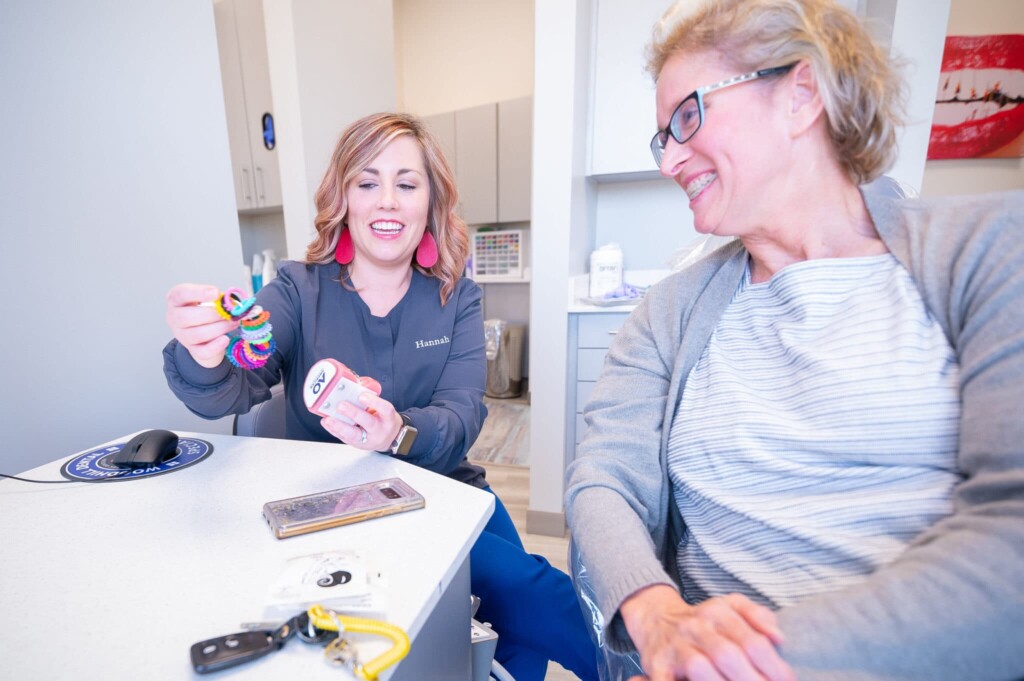Good overall health is closely tied to good oral health, which in turn stems from proper oral hygiene and regular dental examinations and cleanings. But some worry whether they can afford those semi-annual dental checkups — or the dental work that may come from them. Dental insurance can help!
Woodhill Dental Specialties wants to make sure finances never get in the way of your healthy smile. That’s why we accept pediatric dental insurance and offer other financing options to help you pay for your dental visit or orthodontics.
How much does dental insurance or pediatric dental insurance pay, and what do you do if it doesn’t pay enough? Let Woodhill Dental Specialties help you out!

What is dental insurance compared to medical insurance, and why do you need it? If you have medical insurance, it should include dental coverage.
Unfortunately, that’s not how it works. Most medical insurance plans do not cover any type of dental work. Instead, companies offer supplemental or separate dental insurance policies to cover family or cosmetic dentistry.
Do you know how to use dental insurance? Like medical insurance, dental insurance offers different coverage for specific treatments or medications, and the coverage provided is based on the plan you select. It also depends on whether your dentist, oral surgeon, or orthodontist is “in network” or “out of network.”
What does it mean to be in network vs. out of network? It means they’ve either agreed to be part of that insurance company’s system and abide by their terms and negotiated costs (in-network) or they aren’t part of the system and set their own terms and costs (out-of-network).
What does dental insurance cover? Dental insurance can be purchased for an individual, but some plans offer coverage that includes just a spouse, while others cover the whole family. Most plans cover preventive care (regular exams and cleanings) and basic treatments for common issues such as cavities, gum disease, and root canals.
Family plans will have higher premiums and deductibles, but the cost would be lower than if each family member had an individual plan. Family plans are designed to save you money in the long run by covering everyone for one fixed price.
Dental insurance may also cover costlier fixes and cosmetic treatments, such as dental implants, bridges, crowns, veneers, and dentures. It may also cover orthodontics. However, dental insurance often only covers a portion of these services, and in some cases, it doesn’t cover them at all. You’ll need to check with your policy or provider to determine how much they cover for each service.
Dental insurance, like medical insurance, has a one-year cycle. That means your benefits and deductibles reset annually. Whether that happens on Jan. 1 or your enrollment date depends on your provider. Be sure to read all the terms of your dental insurance policy before you sign up, or you may be stuck with it for the whole year before you can make changes.

There are insurance plans, and there are dental benefit plans. What’s the difference between dental insurance and dental benefits?
Does dental insurance expire? No, but it may have a deductible and an annual cap, meaning you can’t spend more than a certain amount each year on certain services. It often covers more things than a dental benefits plan.
A dental benefits plan offers a certain amount for each procedure each year, but with no annual cap. So, rather than covering only one cavity filling per year, the plan will cover as many cavity fillings as needed up to a certain cost.
Employers often offer dental benefits plans for individuals and families rather than complete insurance plans. Check with your employer and your policy to understand which one you have.
Similar to medical plans, dental plans can be either Preferred Provider Organization (PPO) plans or Health Maintenance Organization (HMO) plans. To break it down simply, PPOs offer the ability to see doctors in and out of network but with higher premiums, whereas HMO plans tend to stay in network and may require referrals for special services, such as oral surgery.
Here are the differences between DPPOs and DHMOs.

Some plans offer Flex Spending Accounts (FSA) or Health Savings Accounts (HSA), similar to those provided with medical insurance. These accounts can be used to pay dental expenses not covered by your dental insurance or benefits plan.
These options allow you to set aside a certain amount of your paycheck and apply it to the card, much like a savings account. Different accounts have different annual maximums. The money in these accounts can then be used for dental expenses.
HSAs and FSAs are designed to cover treatments and certain medical supplies, including prescriptions. However, they usually won’t cover standard supplies such as toothpaste or non-prescription mouthwash.
Can you use HSA for dental and cosmetic services? It depends on the service. Some treatments will be covered if deemed necessary, such as a crown. However, services like teeth whitening may not be covered.
Services for children may be covered, including dental sealants and fluoride treatments. However, those may be covered under your dental insurance or benefits, so check with your policy before paying with your HSA or FSA account.
Dental insurance can be very beneficial for families, because it can cover dental visits each year for everyone in the household. It’s just as important for adults to see the dentist as children! However, sometimes children require more attention at the dentist than adults.
Dental insurance can cover your child’s regular dental cleanings and also the braces or clear aligners they may need later. Woodhill Dental Specialties gladly accepts dental insurance, FSAs, and HSAs; however, we may be considered out-of-network for some plans. We will be happy to work with you and your insurance company!
We also offer alternative financing options, including the use of CareCredit. We will work with you to help you afford your dental or orthodontic services, because we know a healthy smile is priceless!